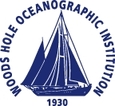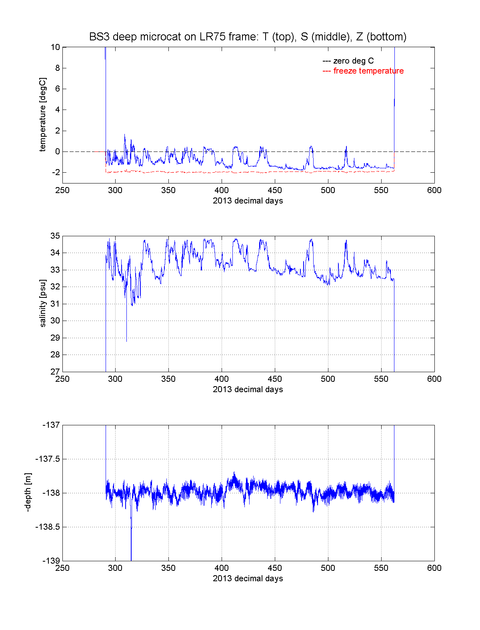


Deployment 2013 to 2014:
Deep Microcat "SBE37"
Deep Microcat "SBE37"

|
Deployment summary: Duration: Oct 18, 2013 to July 17, 2014 Location: 71° 23.639' N, 152° 2.909' W in 147 meters of water Variables measured: pressure, temperature, conductivity Sensor information: SBE37-SM 485 V 2.3b SERIAL NO. 5084; Instrument settings: sampling interval 15 minutes latitude to use for depth calculation = 72 deg; Calibration: applied based on pre- and post cruise SeaBird laboratory calibrations detailed here Initial data: contained in the matlab file bs3_201314_5084_edt.mat |
|
Instrument setup and recovery: The instrument was provided by Scott Worrilow's mooring shop, with calibrations routinely performed at SeaBird's lab facilities. Onboard the Healy shortly before deployment, the instrument was opened, the lithium battery pack was connected, and the instrument was connected via an RS485<->RS232 converter to a PC. For communications, I used Seabird's Seaterm program, checking that "configure" was set for "sbe37 rs485". The instrument clock was checked against the ship's UTC time server, and the standard data collection parameters were confirmed; communications with the instrument were captured in a log file. The mooring was recovered on July 17, 2014. Upon connecting the SBE37 to Seaterm, its clock was found to be 1 minute 9 seconds fast. Data processing: Data processing consisted of the clock adjustment as well as adjustments to the temperature and conductivity records based on a post-deployment calibration at Seabird. The temperature sensor had not drifted, but conductivity drift, while still small, was deemed large enough to re-platinize the cell. The conductiviy slope adjustment based on the post-cruise cal (taken prior to replatinization) was applied as linear drift in time from zero (at deployment) to full (at recovery) correction, and amounted to about 0.002 S/m, or about 0.013 psu for the observed conductivity range (the sensor sensor had "drifted low", in SeaBird parlor. More detail can be found here). Lastly, the data were edited for sensor glitches. In this case, one conductivity spike was removed. Note: the data had been originally processed by Dan Torres, to be used for processing the LR75 ADCP data. The calibration sheet was not available to him at the time (and the S adjustment based on the post-cruise cal does not affect the LR75 data in any realistic way). In addition to the calibration correction, Frank Bahr slightly expanded Dan's edits and corrected the minor clock drift. |